After information that circled regarding Chinese recommendations regarding US bonds and caused a vast turmoil in the markets for several hours, the State Administration of Foreign Exchange of the People's Republic of China stated on Thursday that rumors about China considering slowing or halting purchases of US Treasuries might be fake.
Bloomberg News reported Wednesday that officials reviewing China's foreign-exchange holdings had recommended slowing or halting purchases of US Treasuries, citing people familiar with the matter.
“We think this story could be quoting a mistaken source or it could also be a piece of fake news,” the State Administration of Foreign Exchange said in a statement on its website.
The US Treasury yield edged down to 2.5366 percent from Wednesday's close of 2.549 percent, while the dollar gained 0.3 percent to 111.72 yen after the regulator's comment.
China's foreign exchange reserves, the world's largest, reached a total of $1.19 billion trillion in October 2017. Data from China's central bank showed that China’s foreign exchange reserves rose $3.14 trillion in December as tight regulations and a strong yuan continued to discourage capital outflows.
Some analysts said on Wednesday that there has been an implicit threat from China to US President Donald Trump, after his strict standpoint in the global trade topic and his accusations of China of corrupt practices.
"US Treasuries are often used during the political ping-pong match when trade tensions escalate,” said Stephen Innes, head of trading for OANDA in the Asia Pacific.
“It’s entirely possible that China could take measure to rebalance their reserve as they have done in the past,” he continued.
“But markets quickly realized it’s highly improbable China will stop buying US Treasuries,” he added.









